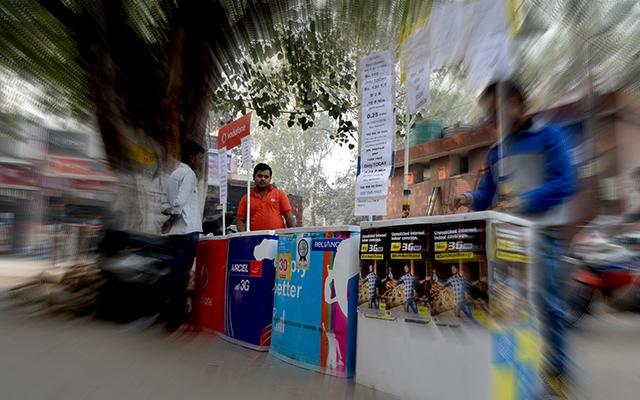The National Democratic Alliance government on Monday started the process for the biggest-ever spectrum auction in the country and relaxed a few rules for telecom operators, but it may not be enough for them to bid aggressively, experts say.
InfraCircle spoke to a number of analysts and telecom executives who, requesting anonymity, said that the government has overlooked the biggest concern of the operators—a high reserve price for the 700 megahertz (MHz) band, considered to be one of the most efficient for 4G services.
For the first time, 700MHz frequency will be auctioned this year, wherein the cost of delivering mobile services in the 700MHz band is about 70% cheaper than that in 2,100MHz, and has better indoor coverage. Due to lower frequency, the 700MHz provides wider coverage, which reduces the number of towers required to set up a long-term evolution network and significantly cuts down capital expenditure involved in making the network live.
However, “we expect to see near-zero bidding for the 700MHz spectrumâ€, Credit Suisse has said in an analyst note.
The much-awaited spectrum auction will start on 29 September this year and a record quantity of airwaves, a total of 2,354.55MHz of spectrum, will be up for sale.
In an effort to attract maximum bidding, the government has decided to relax some rules. For one, new spectrum bands have been made available through a harmonisation process while spectrum caps happen to be easier in this auction as all unsold airwaves from past auctions, as well as surrendered spectrum, will be included here for calculation of spectrum caps. Also, roll-out obligations are almost non-existent as past achievements on other bands will be counted. Besides, spectrum will be released within a month of payment and there will be easy financing for auction winners at 9.3% interest rate.
Despite these measures, analysts do not foresee a big success in the auction process.
“We continue to see the sector constrained on spectrum supply although new entrant Reliance Jio’s enviable portfolio is likely to nudge incumbents to bid. Any spectrum bidding comes with immediate hit to returns, with revenue/market share upside if any being back-ended,†a Credit Suisse note released on 8 August said.
At the reserve price, the spectrum put on auction is worth Rs.5.56 trillion, but once again, sector experts say that the total amount estimated to be raised from the auction will be around $3.5 billion (Rs.22,100 crore) only.
According to 8 August report by Bank of America-Merrill Lynch (BAML), “Bharti/Idea is estimated to spend around $0.7/$0.5 billion to fill their 3G/4G gaps and (we) estimate the total amount raised in the auction to be $3.5 billion. As the government is looking to raise $10 billion from the telcos in FY17, we see the possibility of another auction in March of FY17 where DoT (the department of telecommunications) may auction the unsold spectrum (mainly 700/2,500MHz) at a lower price.â€
Earlier, the global telecom industry body GSMA said in a statement that the total recommended reserve prices for the spectrum bands in the auction are almost double the cost of all spectrum investments to date in India, equating to more than 20 times the annual free cash flow of the entire mobile industry in India.
Interestingly, the maximum that the government had raised at one go from a spectrum auction is Rs1.1 trillion in 2015, when a total of 418MHz was sold across 800MHz, 900MHz, 1,800MHz and 2,100MHz bands.
Prashant Singhal, global telecommunications leader, EY India, echoed similar views saying that the relaxations are nothing but efficiency in the government’s functioning that was lacking before. “They have focused on additional drivers for the auction process without addressing the main issue of high reserve price for 700MHz, which is absurd. The government has taken these steps to get more participation, but we see limited interest from the players in this auction.â€
Another reason that may hinder big bidding is the fact all telecom operators are now grappling with huge debts. As on 31 March, 2016, Bharti Airtel Ltd’s net debt stood at Rs.83,888.3 crore while Idea Cellular Ltd’s debt amounted to Rs.38,750 crore. Experts say that the telecom sector is reeling under a huge debt burden of around Rs.2.5-3 trillion.
The BAML note also said, “We expect limited demand for 700MHz, given the higher pricing at $8.5 billion for pan-India and relatively immature handset/equipment ecosystem. Also, supply of 700MHz being higher than demand—seven slots available and four serious data operators—we do not see any irrational bidding in this auction.â€
Reliance Jio, which acquired spectrum in 2,300MHz band six years ago, has not commercially launched its services yet. Other operators, including Airtel, Vodafone India and Idea Cellular, are yet to recover their money used to acquire 3G spectrum as 3G services have not taken off here in a big way—which is why heavy investments in 700MHz looks unlikely, experts add.
Instead, the focus in this auction will be on filling the gaps in spectrum holdings of existing operators. “Since no spectrum is up for renewal for any of Bharti, Vodafone and Idea, we do not expect aggressive bidding. The upcoming auction is crucial for Idea and Vodafone in our view, as they still have large amount of 3G/4G gaps, and will look to fill those. Bharti and Jio have very few circles without 3G/4G, and will try to bolster their data spectrum holding. We do not foresee meaningful participation from any of the other smaller telcos given their stretched balance sheets,†Goldman Sachs said in a 9 August report after the announcement of notice inviting application by the government on Monday.
Like this report? Sign up for our daily newsletter to get our top reports.







